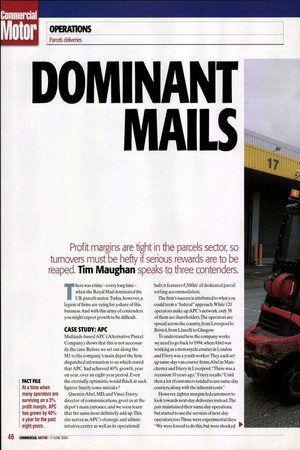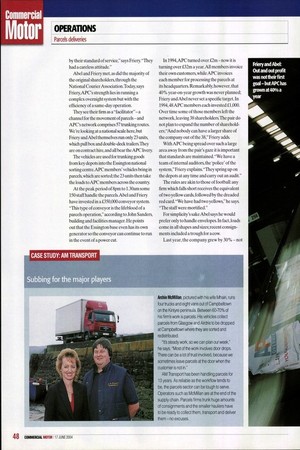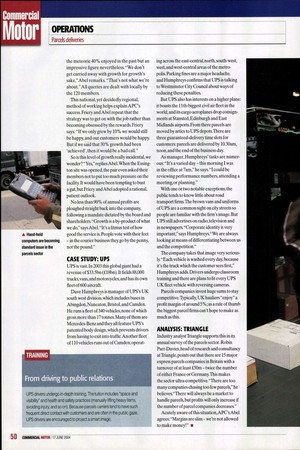DOMINANT MAILS Profit margins are tight in the parcels sector,
Page 44

Page 46

Page 48

If you've noticed an error in this article please click here to report it so we can fix it.
so turnovers must be hefty if serious rewards are to be
reaped. Tim Maughan speaks to three contenders.
There was a time — a very long time — when the Royal Mail dominated the UK parcels sector. Today, however, a legion of firms are vying for a share of this business.And with this army of contenders you might expect growth to be difficult.
There was a time — a very long time — when the Royal Mail dominated the UK parcels sector. Today, however, a legion of firms are vying for a share of this business.And with this army of contenders you might expect growth to be difficult.
There was a time — a very long time — when the Royal Mail dominated the UK parcels sector. Today, however, a legion of firms are vying for a share of this business.And with this army of contenders you might expect growth to be difficult. FACT FILE
At a time when many operators are surviving on a 3% profit margin, APC has grown by 40% a year for the past eight years. CASE STUDY: APC
Midlands-based APC (Alternative Parcel Company) shows that this is not necessarily the case. Before we set out along the M1 to the company's main depot the firm dispatched information to us which stated that APC had achieved 40% growth, year on year, over an eight-year period. Even the eternally optimistic would flinch at such figures. Surely some mistake? Quentin Abel, MD, and Vince Friery, director of communications, greet us at the depot's main entrance, and we soon learn that the sums most definitely add up. This site serves as APC's strategic and administrative centre as well as its operational
hub; it features 5,500m2 of dedicated parcel sorting accommodation.
The firm's success is attributed to what you could term a "federal" approach.While 120 operators make up APC's network, only 38 of them are shareholders.The operators are spread across the country, from Liverpool to Bristol, from Llanelli to Glasgow.
To understand how the company works we need to go back to 1994, when Abel was working as a motorcycle courier in London and Friery was a youth worker. They each set up same-day van courier firms;Abel in Manchester and Friery in Liverpool. "There was a recession 10 years ago," Friery recalls. "Until then a lot of customers tended to use same-day couriers, along with the inherent costs." However, tighter margins led customers to look towards next-day deliveries instead.The pair maintained their same-day operations, but started to use the services of next-day operators, too.Those were experimental days. "We were forced to do this, but were shocked
by their standard of service," says Friery. "They had a careless attitude."
Abel and Friery met, as did the majority of the original shareholders, through the National Courier Association.Today, says Friery,APC's strength lies in running a complex overnight system but with the efficiency of a same-day operation. They see their firm as a "facilitator"a channel for the movement of parcels and APC's network comprises 57 trunking routes. We're looking at a national scale here, but Friery and Abel themselves run only 23 units, which pull box and double-deck trailers.They are on contract hire, and all bear the APC livery
The vehicles are used for trunldng goods from key depots into the Essington national sorting centre.APC members' vehicles bring in parcels,which are sorted; the 23 units then take the loads to APC members across the country.
At the peak period of 8pm to 1.30am some 150 staff handle the parcels.Abel and Friery have invested in a 1350,000 conveyor system. "This type of conveyor is the lifeblood of a parcels operation," according to John Sanders, building and facilities manager. He points out that the Essington base even has its own generator so the conveyor can continue to run in the event of a power cut.
In 1994,APC turned over £2m now it is turning over £32m a year. All members invoice their own customers, while APC invoices each member for processing the parcels at its headquarters. Remarkably, however, that 40% year-on-year growth was never planned; Friery and Abel never set a specific target. In 1994,48 APC members each invested 11,000. Over time some of those members left the network, leaving 38 shareholders.'The pair do not plan to expand the number of shareholders;"And nobody can have a larger share of the company out of the 38," Friery adds.
With APC being spread over such a large area away from the pair's gaze it is important that standards are maintained."We have a team of internal auditors, the 'police' of the system," Friery explains. "They spring up on the depots at any time and carry out an audit."
The rules are akin to those of football: any firm which falls short receives the equivalent of two yellow cards, followed by the dreaded red card. "We have had two yellows," he says. "The staff were mortified."
For simplicity's sake Abel says he would prefer only to handle envelopes. In fact, loads come in all shapes and sizes; recent consignments included a trough for a cow. Last year, the company grew by 30% not
the meteoric 40% enjoyed in the past but an impressive figure nevertheless. "We don't get carried away with growth for growth's sake," Abel remarks. "That's not what we're about." All queries are dealt with locally by the 120 members.
This national, yet decidedly regional, method of working helps explain APC's success. Friery and Abel repeat that the strategy was to get on with the job rather than becoming obsessed by the rewards. Friery says: "If we only grew by 10% we would still be happy, and our customers would be happy. But if we said that 30% growth had been 'achieved', then it would be a bad call."
So is this level of growth really incidental, we wonder? "Yes," replies Abel. When the Essington site was opened, the pair even asked their members not to put too much pressure on the facility. It would have been tempting to bust a gut, but Friery and Abel adopted a rational, patient outlook.
No less than 90% of annual profits are ploughed straight back into the company, following a mandate dictated by the board and shareholders."Growth is a by-product of what we do," says Abel."It's a litmus test of how good the service is. People vote with their feet — in the courier business they go by the penny, not the pound." FrIt*1 4•61 III 11 Onl VI • IrMirur1l I Subbing for the major players
Archie McMillan, pictured with his wife Mhairi, runs four trucks and eight vans out of Campbeltown on the Kintyre peninsula. Between 60-70% of his firm's work is parcels. His vehicles collect parcels from Glasgow and Airdrie to be dropped at Campbeltown where they are sorted and redistributed.
"It's steady work, so we can plan our week," he says. "Most of the work involves door drops. There can be a lot of trust involved, because we sometimes leave parcels at the door when the customer is not in."
AM Transport has been handling parcels for 13 years. As reliable as the workflow tends to be, the parcels sector can be tough to serve. Operators such as McMillan are at the end of the supply chain. Parcels firms trunk huge amounts of consignments and the smaller hauliers have to be ready to collect them, transport and deliver them no excuses. CASE STUDY: UPS
UPS is vast. In 2003 this global giant had a revenue of $33.5bn (£18bn). It fields 88,000 trucks, vans, and motorcycles, and has its own fleet of 600 aircraft. Dave Humphreys is manager of UPS's UK south west division, which includes bases in Abingdon, Nuneaton, Bristol, and Camden. He runs a fleet of 340 vehicles, none of which gross more than 17 tonnes. Many of them are Mercedes-Benz and they all feature UPS's patented body design, which prevents drivers from having to exit into traffic. Another fleet of 110 vehicles runs out of Camden, operat
ing across the east-central, north, south-west, west, and west-central areas of the metropolis. Parking fines are a major headache, and Humphreys confirms that UPS is talking to Westminster City Council about ways of reducing these penalties.
But UPS also has interests on a higher plane: it boasts the 11th-biggest civil air fleet in the world, and its cargo aeroplanes drop consignments at Stansted, Edinburgh and East Midlands airports. From there parcels are moved by artics to UPS depots.There are three guaranteed-delivery time slots for customers: parcels are delivered by 10.30am, noon, and the end of the business day.
As manager, Humphreys' tasks are numerous: "It's a varied day — this morning I was in the office at 7am," he says. "I could be reviewing performance numbers, attending a meeting, or planning."
With one or two notable exceptions, the public tends to know little about road transport firms.The brown vans and uniforms of UPS are a common sight on city streets so people are familiar with the firm's image. But UPS still advertises on radio, television and in newspapers. "Corporate identity is very important," says Humphreys. "We are always looking at means of differentiating between us and the competition."
The company takes that image very seriously."Each vehicle is washed every day, because it's the truck which the customer sees first," Humphreys adds. Drivers undergo classroom training and there are plans to fit every UPS UK fleet vehicle with reversing cameras.
Parcels companies invest huge sums to stay competitive.Typically, UK hauliers "enjoy" a profit margin of around 5%; as a rule of thumb the biggest parcel firms can't hope to make as much as this. ANALYSIS: TRIANGLE
Industry analyst Triangle supports this in its annual survey of the parcels sector. Robin Parr-Davies, head of research and consultancy atTriangle, points out that there are 15 major express parcels companies in Britain with a turnover of at least £50m — twice the number of either France or Germany.This makes the sector ultra-competitive. "There are too many companies chasing too few parcels," he believes."There will always be a market to handle parcels, but profits will only increase if the number of parcel companies decreases." Acutely aware of this situation,APC's Abel agrees:"Margins are slim — we're not allowed to make money!" • " 1 1 From driving to public relations UPS drivers undergo in-depth training. The tuition includes "space and visibility" and health and safety practices (manually lifting heavy items, avoiding injury, and so on). Because parcels carriers tend to have such frequent direct contact with customers and are often in the public gaze, UPS drivers are encouraged to project a smart image,




























































































































































































